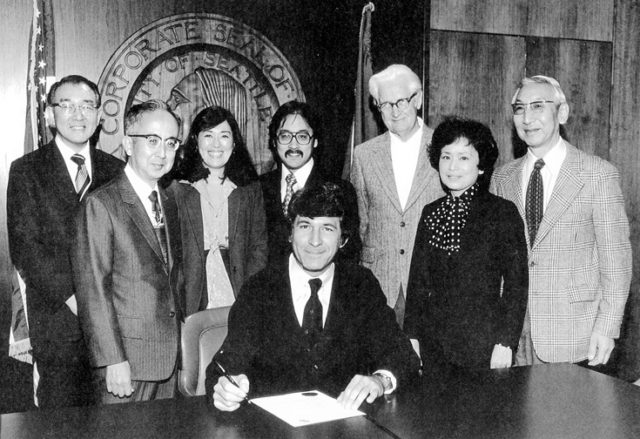
by David Yamaguchi, The North Ameican Post
A memorial service was held for Ron Mamiya at the Seattle Betsuin Buddhist Temple on June 8. Of the remembrances delivered, those by Rod Kawakami were of the broadest interest to readers, and so are excerpted below.
EARLY YEARS
“I was asked to talk about Ron’s early legal career when he was in private practice and we shared office space way back in the early 70s.
“Ron had a certain charm about him, and he had a way of getting people to come together. He was responsible for forming the band when [he] recruited Bob Yamagiwa and myself to join him at his office… in the heart of the International District… Each of us had our own practice and went through good times and some lean times together as we struggled to establish ourselves as attorneys.
“Being right there in the ID at a time Chinatown was evolving, Ron and I were able to get involved in a number of different causes and with various community organizations. In those early days, Ron was not just good at getting people together… he was also known for his passion and dedication to social justice issues and Asian-American causes.
DAY OF REMEMBRANCE
“One of the things I remember was Ron’s participation in the first ever Day of Remembrance. Along with principal organizers Frank Chin, Frank Abe, and Kathy Wong, and other prominent JACLers (Japanese American Citizens League members), Ron was a member of the planning committee that staged the first Day of Remembrance in 1978.
“The Day of Remembrance is an event that is put on to observe the issuance of President Roosevelt’s Executive Order 9066, which authorized the incarceration of over 120,000 people of Japanese ancestry including American citizens during World War II.
“I can recall several of the pre-event planning sessions that took place in our law office conference room. The meetings went on for hours, sometimes late into the evening.
“The event took place on November 25, 1978. We knew that there was going to be national press coverage and had hoped that it would draw enough of a crowd for a good showing. This was in the era where the camp experience was still in the shadows and those who were incarcerated were mostly embarrassed and reluctant to speak about it. I remember a discussion with Ron that they were hoping to draw maybe 100-200, but nobody knew who would come or how many.
“Some of you here may have attended and might remember. The plan was for everyone to meet at the old Sick’s Stadium parking lot to register and then caravan by car to the Puyallup Fair Grounds, which was the Seattle area “Assembly Center” [where] Japanese Americans were gathered for shipment to their eventual incarceration locations.
“Everyone was totally shocked when over 2,200 showed up for registration. The caravan to Puyallup went down I-5 and stretched 4 miles long. There were another 200 or more that didn’t join the caravan in Seattle but joined in later at the fairgrounds.
“Because of the success, this event is now held annually, and it has spread to other cities around the country. There are currently 20 other cities that are holding Day of Remembrance events.
REDRESS CAMPAIGN
“I also recall that during the Redress campaign, Ron was active in JACL and was chosen as the Seattle representative to the JACL national redress committee. Back in the early redress days, Seattle and JACL’s national redress committees did not always see eye to eye on what redress should look like or on the tactics to achieve redress. Seattle’s plan for redress was more radical and ambitious than what the National Committee wanted to pursue.
“Needless to say, representing Seattle’s interests didn’t make him popular with the National Committee. I will never forget that Ron stood there and took a lot of bullets and public criticism from National JACL in advocating for Seattle’s position. He really took one for the team and more like two or three.
“In the end, as we all know, the Civil Liberties Act of 1988 was passed. This legislation didn’t just provide an apology and $20,000 to the unjustly incarcerated… it serves as a reminder to everyone that what happened to the Americans and permanent residents of Japanese ancestry should never happen again.
“After he left private practice, Ron went on to serve the community for decades as a Seattle municipal court judge.”







